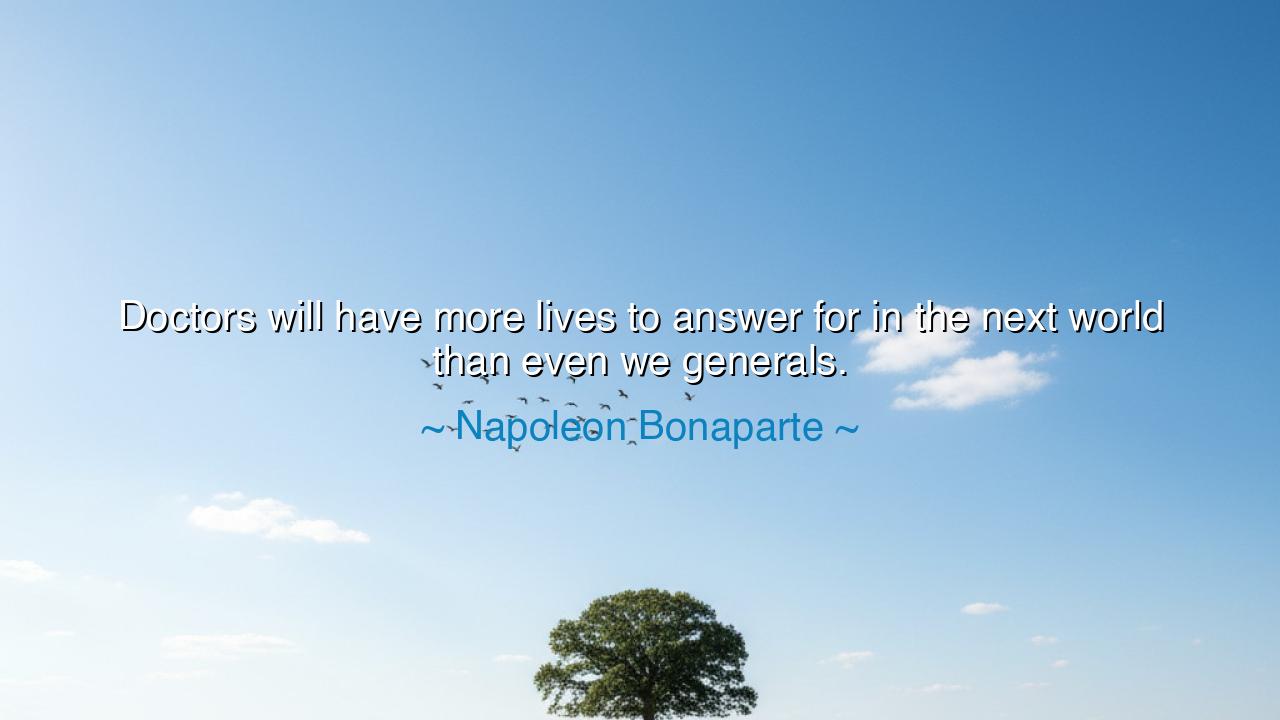
Doctors will have more lives to answer for in the next world than






In the weighty halls of history, few figures have shaped the world as powerfully as Napoleon Bonaparte. His words, "Doctors will have more lives to answer for in the next world than even we generals," carry the weight of deep reflection and solemn recognition of the responsibility borne by those who wield the power of life and death. At first glance, one might think of the general as the figure with the most to answer for, given the countless lives lost in battle under his command. Yet Napoleon’s words turn our gaze to those whose influence is often subtler but no less profound—the doctors, the healers, the ones entrusted with the care and preservation of life.
This quote speaks to a fundamental truth that has echoed through the ages: that the value of life, and the responsibility for its preservation, is not confined to the battlefield. The ancient Greeks, who held both military prowess and medical expertise in high regard, understood that to command life in war was not an act of honor but of necessity, a burden placed upon those who lead. Hippocrates, the father of medicine, famously invoked the principle of "do no harm" in his Hippocratic Oath, setting a standard for doctors to follow, one that was fraught with ethical responsibility. Napoleon, in his own way, acknowledges this burden, albeit with a twist of irony and perhaps even a hint of envy, for the doctor, though not a warrior in the conventional sense, holds a power no less monumental.
The ancient Romans also wrestled with this idea of power over life and death, particularly in their philosophy of virtue and the role of public servants. The emperor, who had the authority to wage war and to make decisions that led to both victory and defeat, was often seen as a figure with a divine connection to the fate of his people. But as Cicero would argue in his writings, the true measure of power comes not in the ability to take life, but in the ability to preserve and enrich it. In this sense, Napoleon’s words reflect a deeper moral conflict, recognizing that the doctor, in his effort to save life, is held to a higher standard than the warrior, whose very profession is to confront and destroy.
Napoleon himself, a military genius, understood the devastating consequences of war—the loss of life, the toll on both soldiers and civilians. Yet, he also knew the immense responsibility that lay in leadership. However, the general has a different kind of accountability. His decisions, although profound, are often made in the context of the greater strategic goal. The doctor, on the other hand, is tasked with an even more immediate, personal responsibility. He or she holds within their hands the power to either save or endanger a life with every diagnosis, every treatment, every decision. And in this, Napoleon sees a much heavier burden than the one he bore in leading armies to battle.
Consider the ancient tale of Asclepius, the Greek god of healing, who was revered as a deity capable of bringing the dead back to life. His powers were unmatched, and yet even he was not immune to the weight of life and death. Asclepius' healing brought him into conflict with Zeus, who feared that humanity's immortality would disrupt the natural order of things. Here we see the divine tension between life-giving and life-taking powers. The ancient world recognized the power of medicine, understanding that those who have the ability to heal, to restore life, must also bear the responsibility for the consequences of their actions.
In our own time, we see the truth of Napoleon’s words in the world of modern medicine. Each day, doctors face the difficult decisions of who lives and who dies, who receives treatment and who must be turned away. Their actions are not simply clinical; they are deeply ethical, and they carry the weight of the lives they affect. Dr. Paul Farmer, a modern-day figure much admired for his work in global health, once said, “The idea that some lives matter less is the root of all that is wrong with the world.” In a way, this statement echoes the sentiment of Napoleon’s quote: the doctor holds a sacred trust, one that can preserve life but also inadvertently contribute to its loss.
The lesson we must take from this is twofold. First, that life—in its fragility and value—is a sacred trust, whether in the hands of a general or a doctor. The responsibility to uphold life, to protect it, and to treat it with dignity, should never be taken lightly. Leaders and healers, in their distinct ways, shape the world through their decisions, and their moral responsibility is immense. Second, that we, as individuals and as societies, must approach the sacredness of life with the deepest respect and awareness, acknowledging the burden of those who hold power over life, whether in battle or in medicine.
As we move forward, let us reflect on Napoleon’s sobering truth, and in doing so, cultivate a deep respect for those who care for the well-being of others. Whether through medicine, leadership, or service, we all bear the responsibility to nurture and protect life. In our own lives, let us strive to respect the sanctity of life in every decision we make, understanding that in the hands of the healer and the leader alike, the future of humanity rests. Only in doing so can we ensure that our actions honor the delicate balance between life and death, and that we do not fail those who depend on us.






AAdministratorAdministrator
Welcome, honored guests. Please leave a comment, we will respond soon